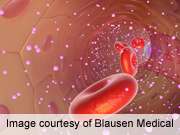Molecular method classifies patients with polycythemia vera

(HealthDay)—Patients with polycythemia vera can be classified according to disease behavior, independently of Janus kinase 2 (JAK2) V617F allele burden, after removing sex as a potential confounder, according to a study published in the Aug. 28 issue of the New England Journal of Medicine.
Jerry L. Spivak, M.D., from the Johns Hopkins University School of Medicine in Baltimore, and colleagues analyzed gene expression in CD34+ peripheral-blood cells from 19 patients with polycythemia vera. Oligonucleotide microarray technology was used after correcting for confounding by sex.
The researchers found that in a comparison of gene expression in patients and healthy persons of the same sex, men with polycythemia vera had twice as many up-regulated or down-regulated genes. One hundred two genes were identified that had differential regulation that was concordant in men and women. In unsupervised hierarchical clustering, the patients could be divided into two groups, which were not significantly different in terms of age, neutrophil JAK2 V617F allele burden, white-cell count, platelet count, or clonal dominance. There were significant between-group differences with respect to disease duration, hemoglobin level, thromboembolic event frequency, palpable splenomegaly and splenectomy, chemotherapy exposure, leukemic transformation, and survival. A supervised approach using a top-scoring-pair classifier segregated the patients into the same phenotypic groups with an accuracy of 100 percent.
"We identified an accurate molecular method for classifying patients with polycythemia vera according to disease behavior," the authors write.
More information: Full Text (subscription or payment may be required)
Copyright © 2014 HealthDay. All rights reserved.















